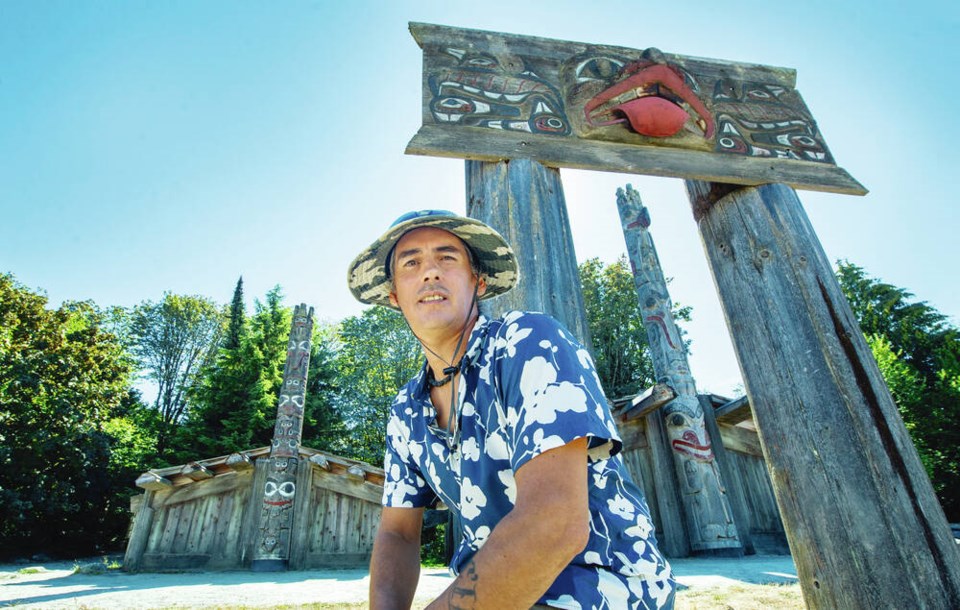Tattuuskulth (Tatt) Charlie, a first-year humanities student at the University of B.C., doesn’t plan to join too many orientation activities — no pub crawls or scavenger hunts. At 48, he’s long since left home, lived out his rebellious youth and raised four children.
Charlie, a member of Tla-o-qui-aht First Nation on the west coast of the Island, will be the oldest on-campus first-year student at UBC this year, and although that might garner him some side-eyes from the 19-year-olds, the age difference isn’t something he’s worried about.
“I’m sure we’ll have some interesting conversations,” said Charlie. And that’s the point: He has found a voice, and he plans to use it.
“Education is the right path for what I want to do,” he said.
Charlie was raised in East Vancouver until age 13, when a family breakdown left him without a secure sense of home.
“I bounced around quite a bit after that,” said Charlie.
Finally, he returned to the Tla-o-qui-aht village of Opitsaht on Meares Island to live with extended family. The 17-year-old and other island kids were bused to Ucluelet Secondary. It was 1990.
“It was a different time,” said Charlie. “They still had segregated buses. There was an Indian bus and a white bus. It was really tough. Natives against Natives, Natives against non-Natives. It was really divided. I didn’t fit in at all.”
There was also an unofficial streaming system where Indigenous students were pushed toward the general education development program. Charlie fought for his right to be in regular classes: “They were trying to force me into GED. I told them I didn’t want to do that.”
He joined the regular student stream, but that put him — a city kid — at odds with local Indigenous kids who had been pushed into GED. Charlie was angry, and he was outspoken. That’s where everything “hit a wall.”
When a teacher called a classmate dumb, Charlie hit his limit: “She was crying right beside me. It was not cool.”
After speaking out in her defence, he was expelled: “It felt like the right thing. I had to do it.”
After that, the teen took any job he could. He worked as a dishwasher, deckhand, zip-line guide, Indigenous art gallery assistant and later as a Tribal Park Guardian in Tla-o-qui-aht territory.
“If you don’t have education, you go for experience,” said Charlie.
Becoming a dad at age 20 made that work meaningful — for a time.
Once the kids grew up, Charlie started thinking about his own future and returned to Vancouver: “I had just kind of topped out. The education I had wasn’t going to take me any further.”
On his days off, Charlie would go to the Museum of Anthropology and spend hours poring over the exhibits.
“I felt so comfortable there. The drawers and drawers and drawers of artifacts were just amazing for me to see. I started asking myself: ‘How come we can’t do this in our own Nations?’ ”
After COVID-19 shut down the catering company he was working for, Charlie was at loose ends. When he learned about an upgrading course at the Native Education College in Vancouver, he decided to take “a leap of faith.”
“There were a lot of amazing people at that college that were there for me,” said Charlie — and that included students he struggled through advanced mathematics with. “All these beautiful Native people, doing what I wanted to do.”
Charlie graduated as valedictorian of his class with one goal in mind: to become a curator and start an Indigenous museum in Tofino, where he can reach out to other Indigenous youth who might be inspired by “the things their ancestors did without machinery and tools.”
He also hopes to encourage young Indigenous kids to do what he did: fight for their right to an education.
It will take five years to get through his undergrad and a master’s in anthropology, but Charlie knows something that the younger members of his cohort still have to learn: “When you get older, time flies by.”



